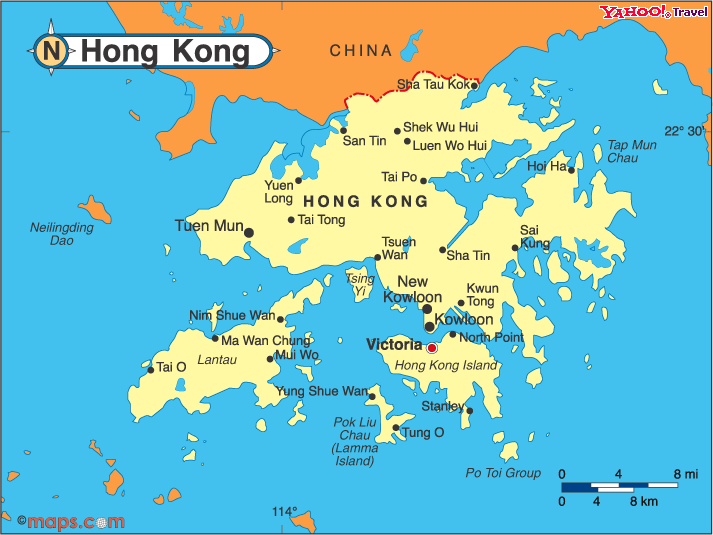- Hong Kong is a peninsula below the southern border of China, and several surrounding islands. The total area it encompasses is 1,103 sq kilometers, or 685 sq miles.
- On this peninsula and its islands live about 6.9 million people. That's more than the populations of Los Angeles and Chicago combined.

Map from Yahoo Travel
- Hong Kong was occupied by Great Britain from 1841, when China gave it to the UK after the Opium Wars, until 1997, or 156 years. Portuguese sailors were among the first Europeans to trade with Hong Kong, and a Portuguese cultural influence remains in Hong Kong to this day.
- In 1984, China and the UK signed an agreement that would make Hong Kong became a Special Administrative Region of China in 1997. Under this agreement, Hong Kong operates almost autonomously from China, which is allowed to control only Hong Kong's foreign affairs and defense operations. This agreement is to stay in place until 2047.
- The UK's influence can still be seen in the fact that people drive on the left, they use the British spelling of words like "colour" and "centre," and the country's deepest port is called Victoria Harbour.
- Today, 96% of the country's population is Chinese, primarily Cantonese. The remaining 4% are mostly Filipinos, Indonesians, or Americans.
- The name Hong Kong means "fragrant harbor." Or I should say, "fragrant harbour."
- Hong Kong's official name, in English, is Hong Kong, Special Administrative Region of the People's Republic of China. Local folks who speak Mandarin call their country Xianggang.

Xianggang during the day (photo from CCTV)
- Hong Kong's biggest industries are clothing and textiles, tourism, shipping, and electronics and plastics, including toys, watches, and clocks.
- Its primary source of income, however, comes from the fact that it has one of the largest and busiest ports in the world.
- As the world's 11th largest trading economy and with Asia's 2nd biggest stock market, Hong Kong is widely recognized as an affluent, bustling economy in Southeast Asia. Even so, just over 31% of Hong Kong's population lives in public housing.
- Average wages across all industries are $US 1,370 per month. Income tax is 16%.

- Hong Kong gets a lot of monsoons, and sometimes typhoons. In the summer, winds from the south bring moist, humid air. In the winter, winds from the north cool things off.
- Hong Kong-ites have 5 AM radio stations and 9 FM stations. They have 4 broadcast TV stations and 4 airports.
- People use smart payment cards called Octopus cards, which are used to pay fares for railways, buses, and ferries, and they are also used in parking meters and garages.
CIA World Factbook, Hong Kong
US Census, Population of the 100 Largest Urban Places, 1990
Hong Kong SAR Government Information Centre, Hong Kong in Brief
Wikipedia, Hong Kong
The Economist, Hong Kong Factsheet
No comments:
Post a Comment
If you're a spammer, there's no point posting a comment. It will automatically get filtered out or deleted. Comments from real people, however, are always very welcome!